How 'Little House on the Prairie' star Melissa Gilbert shaped a generation of women
SIMI VALLEY, Calif. – Maybe you are a Laura, too.
If so, you are probably between the ages of 40 and 70, and your name is actually more likely Lisa or Michelle, Susan or Debbie. (Unless you are me, in which case you really are a Laura.)
And if so, Laura Ingalls shaped your life in a way that’s hard to articulate, but easy to feel. Maybe it was partly from the “Little House” series your mom read to you in bed each night, but more likely it was from Melissa Gilbert on NBC's TV show “Little House on the Prairie.”
She was Laura, the girl we wanted to be and the best friend we needed. The TV character was inspired by the books, but was not true to them; the show needed more drama, even in 1974, to hold your attention, especially when it took Pa an entire chapter to build a door.
Laura was mischievous.
She stood up for herself. She wanted to make the right choice, but she struggled with temptation, jealousy, doing the right thing. It was part of her appeal. She wasn’t perfect, but she always got to the right thing.
I was the 5-year-old girl who asked for pigtail braids and calico dresses, fishing poles and black boots.
My mom obliged, and I went to kindergarten the next fall in a long blue and white floral dress she sewed with short sleeves, a compromise because the first day of school in Phoenix was 102 degrees. My mom embroidered a silhouette of Laura Ingalls on my denim school bag.
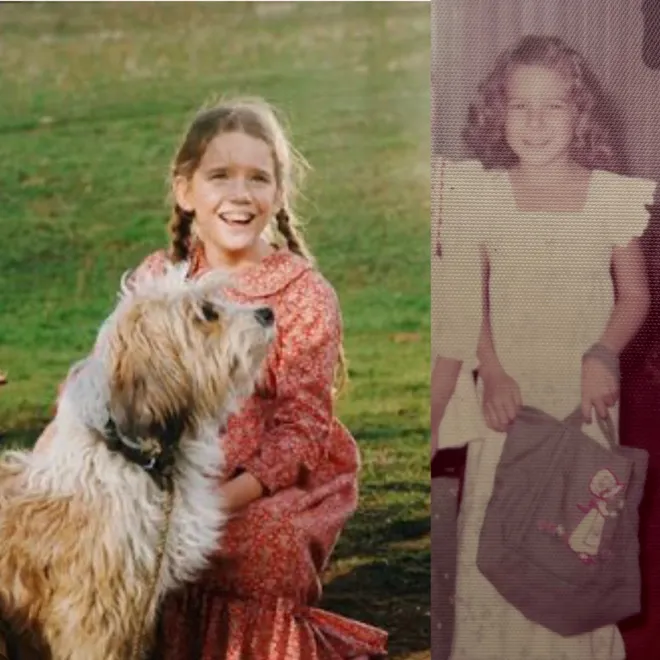
So this is how I find myself now, here with Gilbert, nearly 50 years after “Little House” premiered, standing in front of a replica of the set of the little house, which was a replica of the real house in Walnut Grove, Minnesota, in the 1800s. The replica now sits here in Rancho Santa Susana Park, just a few miles from where the show was filmed between 1974 and 1983.
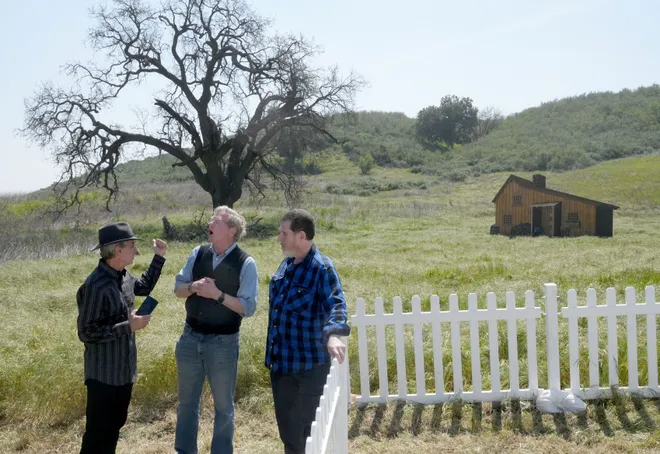
You can see the green hills from here, and if you squint, the trees of Big Sky Ranch, surrounded by houses that stretch through canyons and across freeways to where the Kardashians now live. But now we are Ma’s age from the show, or older. And at 59, Melissa Gilbert is somehow our mom’s age, too, but also our age (or younger) in a weird space-time continuum that exists at the "Little House on the Prairie" 50th anniversary cast reunion and festival on this sunny weekend day in March.
And for a moment, we are back in an America with just three TV channels and a slow-paced show that took us back to even simpler times, every Monday evening for one hour.
There are more than 18,000 people here for Laura. But this is not a festival for the women who call themselves “bonnetheads" and travel to one of seven official home sites. Nor are they hardcore Laura Ingalls Wilder fans who attend Laurapalooza, an academic conference dedicated to the pioneer author, and who hate the show for its historical inaccuracies. This is for the rest of us, who preferred the TV show, who would much rather have an episode inspired by Laura that allows her to push Nellie down a hill in a wheelchair, because we all knew Nellie was faking her paralysis the whole time.
We are grown women now, and can both admire the show and not get lost in whether Laura really wrote the books, or if her daughter, Rose Wilder, did. We don’t want to take away book awards because the portrayal of Indigenous people in the 1800s isn’t the same as ours is now. In the pilot episode, in which a Greek actor plays an Indigenous man, Pa tries to become friends.
We are here to remember that little girl – and ourselves.
Melissa Gilbert embraces aging'Little House on the Prairie' star on why she ditched Botox, implants and is "aging gratefully"
Laura among friends
Three hundred-plus people back, past the booth selling Oleson’s Mercantile canvas tote bags for $30 and wood cutouts of the little house for $250, and past the Old Town Square Tent where Alison Arngrim, who played Nellie, is sharing a story about her TV brother, waits Angela Hernandez.
She is wearing a shirt that says: WWCD? (What Would Charles Do?) with an image of a bare-chested Michael Landon as Charles Ingalls. She wanted a bonnet, but the Modern Prairie booth had sold out that morning, at $24.50 each. She stands behind a woman wearing a full-length calico dress and Doc Martens, and in front of a woman with a fake crow on her head (IYKYK). In many ways, it feels like grown-up Swifties, trading friendship bracelets in muted prairie colors, holding spots for each other in line, sharing tips on where the shaved ice is, and swapping stories about the show.
“She wasn’t just part of my childhood, she was my childhood,” says Hernandez, who was belatedly celebrating her 60th birthday at the festival on a trip from Dallas, and brought a copy of Gilbert’s first memoir, “Prairie Tale.” “I didn’t have the best family life. I pretended Pa was my dad, that this was my family. And every Monday, they were there.”
While the event crowd is mostly white, and skews to the middle-aged among us, there are enough women in their 20s and dressed-up kids, as well as men, to allow you see it as a swath of America, one that’s traveled here from Ohio and New York City, Northern California and Florida.
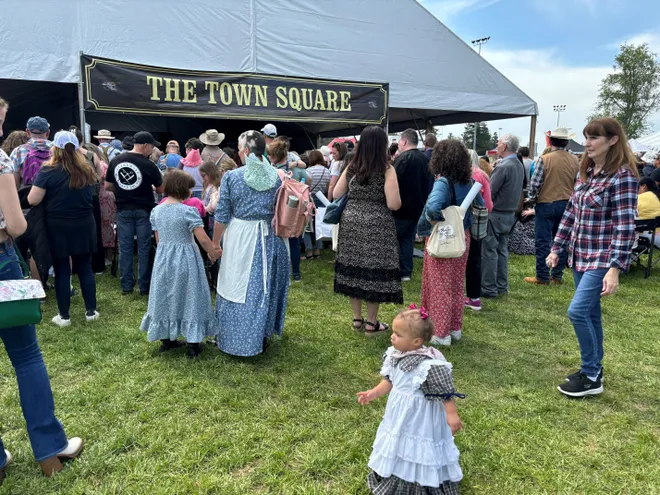
Many proclaim their devotion to Jesus on their T-shirts. Others identify as modern-day homesteaders, raising chickens in their backyards, learning to can and sew, and wearing T-shirts that say: Vote for women.
They paid $45 a day or $200 as a VIP (they did receive a turkey and mashed potato lunch and a commemorative poster) for access to meet and greets and panels. A bus tour of Big Sky Ranch was $75. Selfies and autographs ranged from $10 to $75.
They talk about good people and morals, consumerism and getting back to simpler times. This is a show that Common Sense Media praised, calling the Ingalls family a “model of mutual respect and affection.”
But these fans never left the prairie. They have the DVDs, and stream the show while they work out, sew or cook dinner. So they also know that while the show was seen as wholesome and sweet and filled with love and grit, it was dark. In one season, Walnut Grove dealt with a plague, infant mortality, the loss of parents, poverty, racism and fires.
In a tent, a big screen plays episode after episode, running from one season into another, and here we are with “Lord is my Shepherd,” the two-hour 1974 episode Gilbert says is her favorite, where Laura wrestles with envy, faith and forgiveness. Some fans gather in the tent for shade, but find themselves crying along with the shows.
Gilbert is sitting at a folding table inside a community center. There is blue tape marking a line that is two deep, snakes to the door and stretches through the park to a five-hour wait.
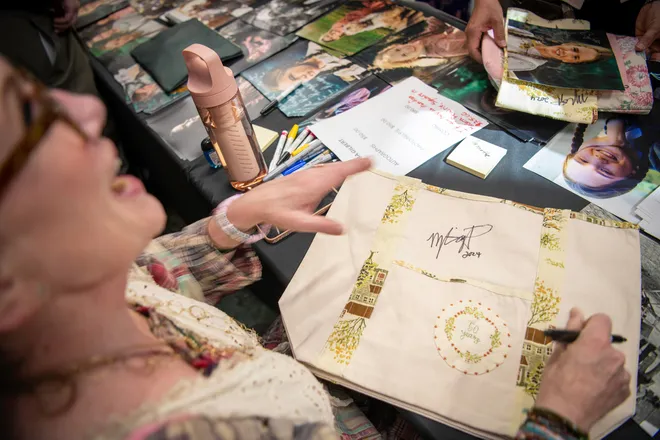
Fans – wearing bonnets and calico, bonnets and jeans – want photos with her. They tell her: "We love you." Sometimes they forget, and yell “Laura.“
Gilbert laughs, “I answer to all of them.”
She’s wearing a cream dress with small roses and lace, pantaloons with boots that look like they belong on the prairie. Her high cheekbones and gray curly hair pulled up reveal she is even prettier than she was 10 years ago.
“‘Little House on the Prairie’ crosses all borders. Everybody can kind of take ownership of it, whether you're politically right or left,” she says. “The conservative movement in this country considers ‘Little House on the Prairie’ their show. And there's the liberal movement that considers it their show because we were telling the stories of the 1970s, which unfortunately are the stories today … about women's rights and voting rights and all of those things.”
Maryanne VanDenBerghe waits in line to meet Gilbert. Her husband of 37 years sent her from Riverton, Utah.
Wearing jeans and a black ’90s inspired black T-shirt with three images of Charles Ingalls that reads "PA," she says she watched “Little House” every week growing up. She shared the show with her five kids, but confesses only her three daughters enjoyed it.
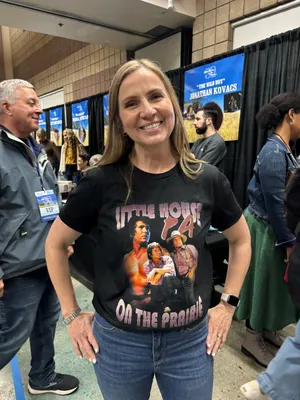
Now she watches “Little House” Mondays through Saturdays while she exercises. “It’s my reward,” says VanDenBerghe, 56. “It starts my day in a good way and makes me feel connected.”
Like many women, she’s nervous about meeting Gilbert, who both helped shape and affected an entire generation of women.
“What do I say to her? How do I act? Heck, how do I even stand?” she says. “OK, I’ll shake her hand; no, that might be too personal for her. I don’t know what to do.”
Women hold scrapbooks, some of them made as children, and can select one of 23 8-by-10 photos of Gilbert to be autographed. The most popular pictures a young Gilbert in a red dress with Jack, a dog that looks suspiciously like a tan-and-white Bernedoodle.
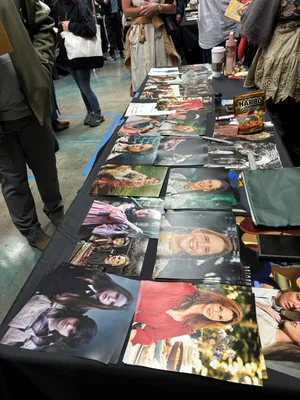
Gilbert signs copies of her 2022 memoir, “Back to the Prairie,” for some fans, and also signs “Little House in the Big Woods,” a book she didn’t write. Not that these fans care. To them, she is Laura.
We were all Lauras
Almost every woman at the event – the Michelles, the Susans, the Amys – shares the same story. She wanted to be Laura. She wanted to be best friends with Laura. She played “Little House” and would pretend to be Laura – and siblings had to be Nellie or Mary, or the younger ones Willie.
“I’ve loved Laura since I was 6,” says Deborah Mendes, from Discovery, California. “I wanted to live in Walnut Grove.”
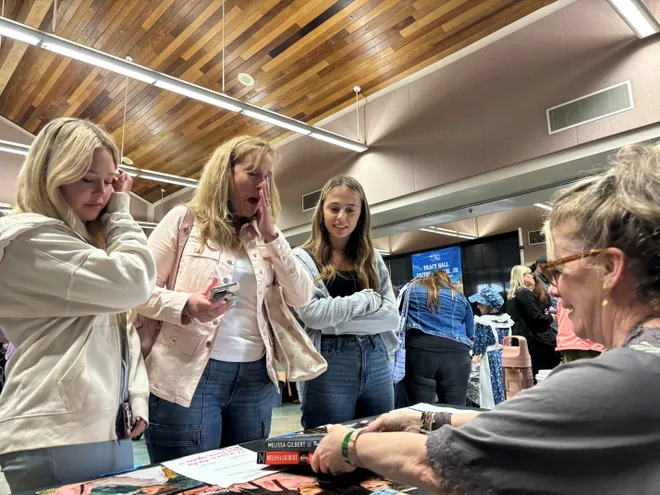
Her two daughters, who accompanied her on the trip from northern California, have the puzzled look as they stare at their mom, the look that says you are realizing your mom is a person, not just your mom.
“She’s so happy,” Skylar Mendes, 21, says. “She’s making me cry.”
Mendes reaches the table and pays for a photo to be taken with Gilbert. “We just love you so much,” she says through tears. “I feel like I was invited to Laura’s house.”
Gilbert wraps her arms around the girls and their mom and smiles.
A few minutes later, Mendes looks at her signed photo.
“I feel like I just met my best friend,” Mendes says, capturing a feeling among many women here. “I wish I could have said something better, something different, so Melissa knows how I feel.”
But it’s more than memories of her childhood. Mendes says her love of Laura, and Gilbert, endures.
“I love how she’s doing now; she’s aging so gracefully, so naturally,” she says. “She’s beautiful and she hasn’t had an easy life, but here she is and I love everything about her.”
Gilbert has signed four cards, 17 photos and a cookbook, and smells like Bath & Bodyworks Ocean hand sanitizer. It isn’t even 11 a.m.
See the "Little House" festivalMeet the fans and see the sets from 'Little House on the Prairie's' 50th anniversary festival
Finding Laura
Moms named children after her.
In the 1970s, Laura was the 20th most popular name. By the 1980s, Laura had been replaced by Lauren, and fallen further down the list. Melissa held steady at No. 7.
By the 2000s, Laura didn’t make the top 100.
I turned 4 the week after the pilot episode aired in 1974, which is one of my first memories. Of Laura’s excitement for the new house Pa built, of how dark and big the prairie felt. I wonder if I remember this from watching it that first time, or from after-school reruns when I watched while my mom worked the night shift as a nurse.
“I lay and looked through the opening. It was lonesome and so still with the stars shining down on the great flat land where no one lived,” Ingalls Wilder would write.
“Late in life,” Caroline Fraser writes in “Prairie Fires,” Laura “would conjure it again and again trying to recapture the stark beauty and isolation of that vista seen through the eyes of her not quite 3-year-old self.”
Maybe both of us remember the prairie first.
A 10-year-old girl dressed in a long blue floral dress with a white apron and bonnet waits in line with a small notebook for an autograph.
Gilbert smiles big when she sees Brookie Zachary, there with her mother, Heather.
Brookie tells her she wants to be a teacher, and wants to grow up and be like her.
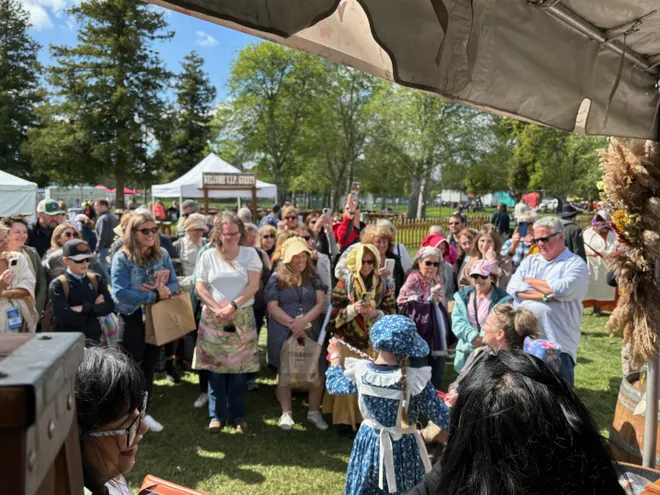
“Oh you want to teach, I love it, “ Gilbert says. “It took me this long to realize what Laura meant to girls. And to see her continue to inspire girls is so good.”
Gilbert is inspired by this next generation – including her 9-year-old granddaughter Lulabelle.
“Seeing it through the eyes of this next generation makes it all the more special. And also a little bit frustrating, because the same things that we were writing about and talking about then, equal rights for women, equal rights for people of color, are still the same things we're fighting for today. I think we've inched forward, but certainly not enough for me, anyway.” Gilbert says.

Losing and finding Laura
Gilbert rides in a golf cart from the autograph table to a stage where she shares stories.
She is tired. She had neck surgery to fix pain from a broken back she had years back. She curses quietly, and laughs and says no one could hear Laura say that. But she is lifted by the energy and eagerness that still sometimes surprises her.
That 50 years later, in a country where we pay monthly subscription fees to watch hundred of niche shows from multiple streaming services, where we hire parenting coaches and go to camps to learn how to be pioneers, where even Barbie has become complicated, it may surprise some that a sweet, simple show about growing up on the prairie has never lost its fan base, even those who still watch it on VHS tapes.
“The thing that moves me the most is when people tell me the stories of how 'Little House on the Prairie' impacted their lives, what their childhoods were like, and why it was so important to them,” she says. “A lot of people have said – and I'm sure will continue to say to me – ‘Look, you were my escape from a bad childhood.’ … We taught a lot of lessons and provided a lot of escapist entertainment.”
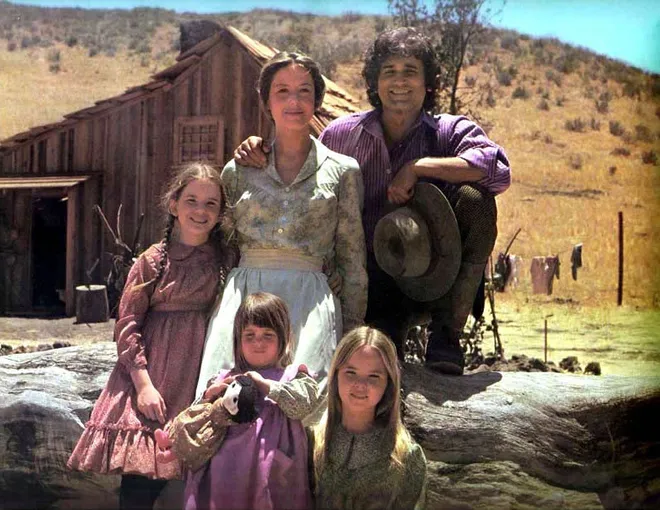
She watched HBO's sex-and-drug-fueled "Euphoria" while she recovered recently, and says there are similarities. Plus, don't forget the scene where Fez (Angus Cloud) watched "Little House" while he talks to Lexi (Maude Apatow.)
"'Euphoria's a lot more raw. But what everyone on that show is looking for are the same things the Ingalls family and all of the people on 'Little House on the Prairie' are looking for: home, family, love, community, faith, understanding, forgiveness," she says. "They're searching for love and they get lost along the way, which we portrayed on 'Little House' So the essence is the same. The storytelling is just different."
"Little House" debuted alongside several other shows in 1974, including “Chico and the Man” and “The Rockford Files." Yet it is one of the few shows that could draw a crowd today, 50 years later, with a character women still love.
But there was a time when Gilbert didn’t feel like a Laura.
And after nine seasons, as she grew from a pig-tailed 9-year-old to an 18-year-old who played a wife and mom, Gilbert wanted an escape from the calico, the bonnets, the foxtails that stuck in Jack’s coat and her wool stockings.
Much of her adult life, in some ways, Gilbert ran from Laura. When she finished "Little House," she dated and got engaged to Rob Lowe (they later broke up). She got married, had her first son, Dakota, and got divorced. And then she got married again, and had another son, Michael.
“My marriage ended and I was going through a lot,” she says. “I was really curious about what was next. What were the choices I was going to make? I’m going to do what’s better for me than what I’ve done up until now. I was trying to figure this out. I’d had missteps," she says. "I dated a guy that wasn’t good for me. I was doing things that made me miserable.”
She acted in the 1983 TV movie “Choices of the Heart,” voiced Batgirl, played Ma in the traveling musical adaptation of “Little House” and was president of the Screen Actors Guild. She competed on ABC's “Dancing with the Stars” in 2012, and tried so hard to continue to look like she thought she should. She was 46.
She had her nosed shaped, breast implants, fillers and Botox.
“And as I started to age, my body started to change. My face started to change. I started to feel uncomfortable and doubt myself. And then it became harder to stay young. And then it became an uphill battle. And I really wanted to find a place where I could just relax and enjoy my life,” she says.
It was also a time when she started accepting that growing older was just part of life, not something to fight. And that maybe being defined by strangers as the role you played for a very specific period of your life isn’t so bad.
She met the man who would become her third husband, actor Timothy Busfield.
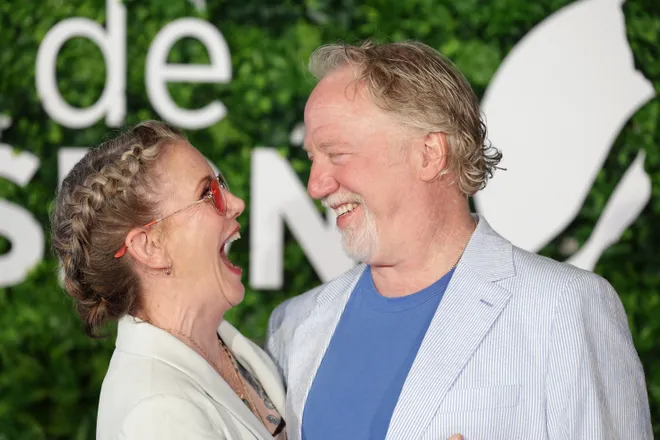
She reconnected with the prairie, in some ways. She and Busfield, 66, bought and renovated a hunting cabin. Her sons and stepchildren are in their 20s and 30s, and she has nine grandchildren. With friend Nicole Haase, she co-founded Modern Prairie, a lifestyle brand that sells prairie inspired clothes (even bonnets), pie carriers and beautiful quilts and linens.
But it’s also a place to connect. The app offers workshops and classes on topics from grief to felting.
“We created a safe space for women over 50 to share themselves and what they're going through, whether it's hormonal changes or life changes,” she says, and “providing a community where these women can support each other as we age, gratefully."
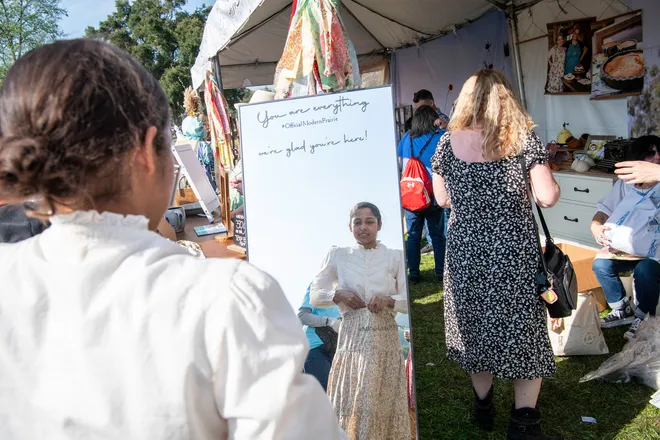
Becoming Laura
So we walk between the autograph session and the photo station, and later pass the Modern Prairie booth where she meets some of her fans. They again tell her how they grew up with her.
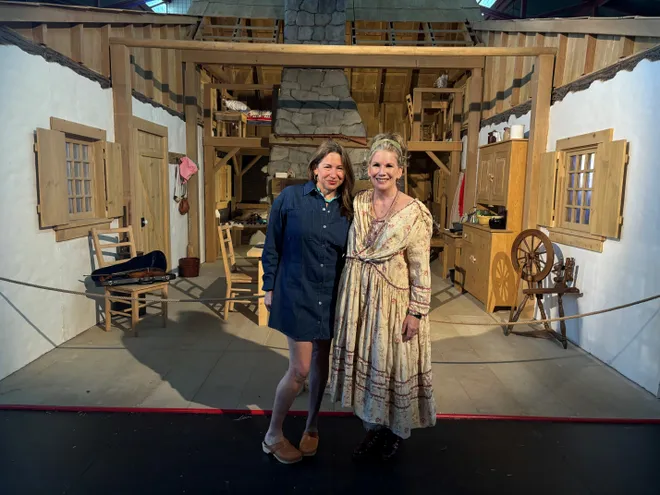
I wanted to tell her how I looked forward to Mondays, that my parents told my older sister and me they were getting a divorce on a Sunday night, and all I could think about and do was wait until Monday to feel safe and secure with the little house. How my mom named me Laura after Laura Ingalls Wilder, about the floral long dress and the school bag. How I’m recently divorced and my youngest of four is headed to college. That I want to also make changes to be better, that I worry too much about my wrinkles.
Instead, I’m quiet, and listen as others tell her this, almost to a script.
Gilbert recognizes this in women, their almost impossible need to tell her about their lives, to thank her. But sometimes, instead, they just burst into tears and can’t say anything, and now worry the photo they want to take with her will be ruined.
She waits for them, sometimes makes them laugh.
In some ways, she doesn’t say much.
She knows that many women are trying to find this part, this inner Laura. That after a divorce or even just being an empty nester, they wonder where that spunky girl is.
“I think of all the qualities that we can have to maintain that sort of youthful wonder. Curiosity is the most important. Curiosity is what keeps us open and vibrant and learning and trying,” she says. “Laura was curious about the world, about everything.”
Gilbert stops for a moment, thinking about all the women who are still searching. She wants to tell them something: “She never left,” Gilbert says. “Laura is in every woman. She is that thing that makes you, you.”
Are you a Laura? A real Laura. Send a note and tell me about how Melissa Gilbert and "Little House" shaped who you are today. Send to ltrujillo@usatoday.com.
Disclaimer: The copyright of this article belongs to the original author. Reposting this article is solely for the purpose of information dissemination and does not constitute any investment advice. If there is any infringement, please contact us immediately. We will make corrections or deletions as necessary. Thank you.







